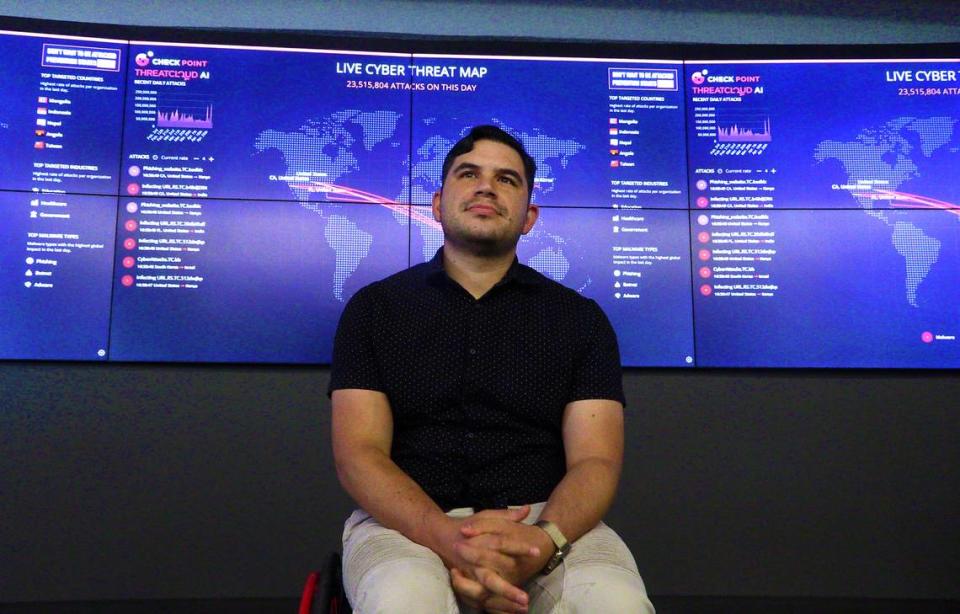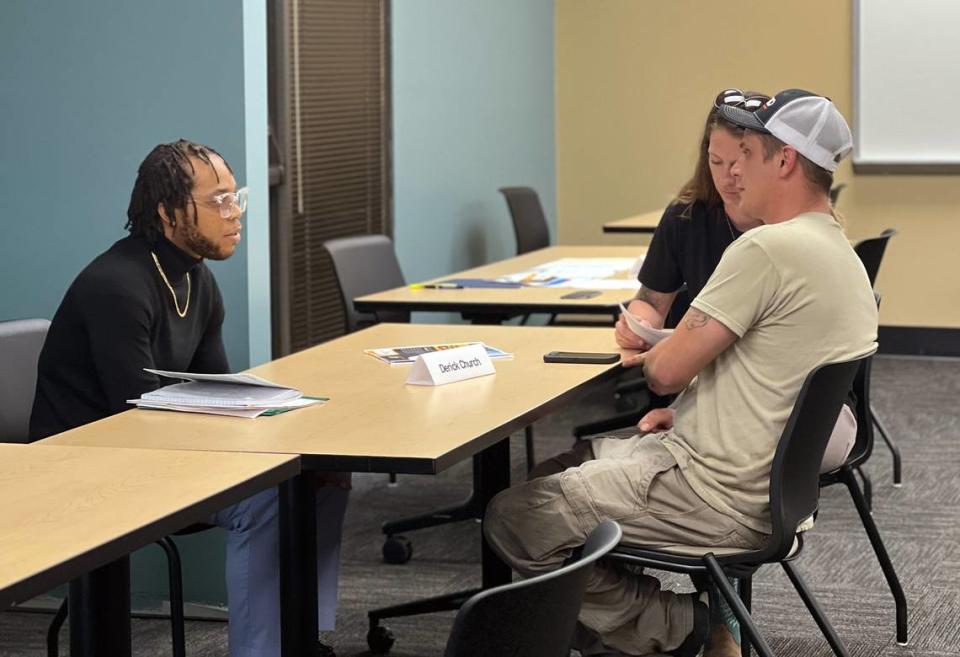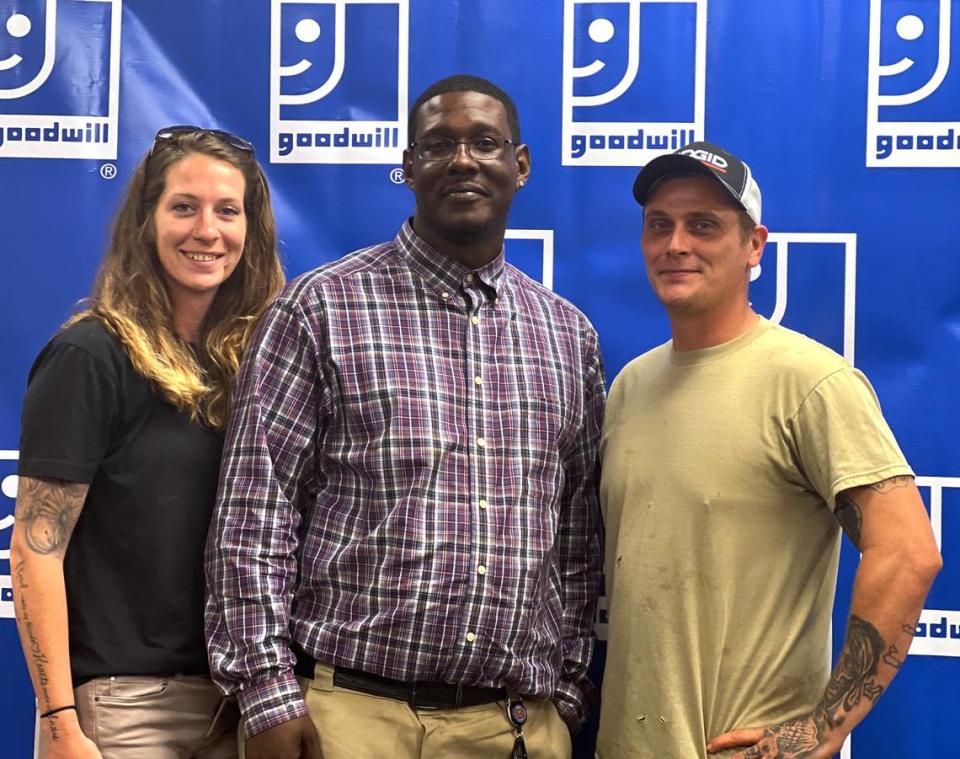Columbus has a shortage of college-educated workers. Here’s how these groups are solving it
Columbus is facing a shortage of college-educated workers, fueled by slow population growth, that affects its economic health.
To address this problem, a coalition of employers, higher education leaders and other organizations are working to bulk up the labor force through a series of partnerships and training programs.
Economists presented an economic forecast for Columbus and the state in January predicting a short recession but strong labor market. The city’s slow population growth is an area of concern, said Jerald Mitchell, president and CEO of the Greater Columbus Chamber of Commerce, during the presentation.
This issue is compounded by a mismatch in the levels of education people in Columbus have and what employers require. There are more job openings for people with four-year degrees in the area than people who can fill them, Mitchell said.
The key to addressing this issue is to bolster the number of area residents who have college degrees. Currently, Columbus residents trail the state average with about 28% of residents over the age of 25 having a Bachelor’s degree or higher, according to the United States Census Bureau. Approximately 33% of residents in the state and about 34% of people nationwide have Bachelor’s degrees or higher.
However a balance needs to be maintained when addressing this issue, Mitchell said, adding that officials need to continue to pursue bringing jobs to the city that don’t require this level of education since there are a lot of people in the region who do not have these degrees.
More than 4,600 jobs were added in the Columbus Metropolitan Statistical Area in the last year as of March, according to the Georgia Department of Labor, with the unemployment rate sitting at 3.8%.
“Contrary to the national narrative, college education continues to unlock opportunity,” Mitchell said in his presentation. “So we have to continue to promote that college degrees, technical certifications and GED’s are going to continue to help people take the next step of their economic progression.”
CSU partnering with corporations for programs
Columbus State University has developed key partnerships with local industries to provide students with mentors, internships and job opportunities, spokesperson Michael Tullier told the Ledger-Enquirer.
“CSU works collaboratively with local businesses, organizations and stakeholders through advisory boards to develop relevant curricula and workforce training programs,” he said.
An example of this collaboration includes the partnership of CSU with some of Muscogee County’s largest employers including TSYS, Aflac and Synovus to start the TSYS Center for Cybersecurity.
TSYS gave a $5 million donation to start this cybersecurity center, said Deborah Kidder, dean of the D. Abbott Turner College of Business at CSU. Students can complete a rapid workforce development program in cybersecurity, NEXUS practitioner’s certificate, within 12 months, Tullier said.
Upon completion, they will have four industry certifications, a guaranteed internship in the field and weekly hand-on experience in a cyber range.
“In the area of cybersecurity, things are changing so very rapidly,” Kidder said. “You need to have that condensed concentrated education, so that (students) can go out and start using those skills that aren’t outdated.”
Technology is changing at an incredible rate, she said, so the school is focusing on making sure students are gaining general, durable skills that can adapt with technology.
Fernando Cabello, medically retired from the U.S. Army after 10 years of service, was looking for a new career field as he transitioned from military life.
Originally from San Antonio, Cabello was stationed at Fort Benning as a drill sergeant. When he was in a car accident and was retired, Cabello looked for a program that he could finish quickly and found it in the NEXUS program at CSU.
“The group setting is cohort-based,” Cabello said. “It reminded me of going through basic training in the Army. We start as a group and the group finishes.”

He enjoyed that the group’s skill levels in the beginning ranged from people who were not familiar with working with computers to other individuals that already had some experience with this type of work.
Now that he’s finished the certificate program, Cabello is living in Columbus and works full-time for Global Payments.
“We had the top brass in the cyber security field from here in Georgia coming in interviewing us, telling us ‘hey, this is where you need to improve and this is what we’re looking for,’” Cabello said.
The relatively new program, which has been running for over a year, has close to 100% employment post graduation, Tullier said.
“What I find amazing is Columbus, Georgia is a good ole family kind of system here,” Cabello said. “These industry professionals are, education-wise, 20-30 years ahead of me. I can ask them for help and for advice. That’s not something you’ll get in San Antonio.”
Columbus Tech and trades
While Columbus State works with employers looking for people with four-year degrees, Columbus Tech and other organizations are focused on preparing people for entry level positions and trades.
The college has almost 200 different programs that range from general education for Associate’s degrees to health sciences, welding, early childhood education and HVAC. Columbus Tech’s mission is to develop the workforce needed in the community to its greatest ability, President Martha Ann Todd told the Ledger-Enquirer, and the school works to reach this goal by ensuring students have the support they need.
“They get quality, industry-approved training at industry level — what they will experience out in the field, equipment and labs,” she said. “We want them to be able to get a job and enter the workforce, but also build a career.”
The school recently held a groundbreaking ceremony for an approximately $5 million project to bring a new facility where as many as 350 new truck drivers could be trained each year. The average truck driver in Columbus can earn about $92,000, according to Indeed.
An economic impact study found that people who earn their high school diploma or an equivalent will generally earn $4,500 more every year, Todd said, and the average income of those that get their two-year degree can increase, on average, by about $8,500. Most Columbus Tech students also tend to continue to live and work in the Chattahoochee Valley region, she said.
While many individuals can attend Columbus Tech to earn certifications in trades such as HVAC and truck driving, other organizations are helping other vulnerable communities in Columbus have access to these types of training programs that can better their economic progress.
From Freedom House to Employed
Earlier this year, SafeHouse Ministries in partnership with Goodwill Industries of the Southern Rivers hosted a program that allowed men experiencing homelessness to take part in a free HVAC training program.
The organizations have held similar programs in the past that include construction training and electrical training, said Julie Bennett, director of marketing and communications at Goodwill.
“HVAC is an industry where a person can make a great living without having to have a college degree,” Bennett said. “And so this provides a free opportunity for people who are interested to come in and get 10 days of training.”

Along with learning how to service units, participants were also taught soft skills that would help them have better success in interviews and speaking to employers. At the end of the training program, the participants attended a career fair that gave them the opportunity to meet with potential employers.
SafeHouse will continue to work with participants not offered a position at the career fair for at least a year after the program is over to help them find a job in the industry.
One of the participants, Michael Edwards, signed up for the program because he knew that people who could service HVAC units are in high demand in Georgia, which meant he could be confident the program would provide him the skills needed to find a job in the field.
“We had a shortage of apprentices last year,” Edwards said. “There weren’t enough people to go around. It was so hot, and I know a lot of people suffer from not having service.”
The program was able to provide more hands-on training and mentorship from an industry professional when Phillip Hall, co-owner of PJ Labor Services, got involved after one of the participants, Brian Nelson, informed him of the program after a chance meeting.

Nelson was an acquaintance of one of Hall’s family members, and happened to meet him through the connection one day not long after Nelson started the program. He told Hall about the HVAC training program after Nelson learned about PJ Labor Services and invited Hall to sit-in.
Hall was impressed after attending one of the classes. He thought he could help elevate the training by donating a unit for the students to use for hands-on experience through taking the unit apart.
“They’ve received really good information,” Hall said. “..It’s a good start to get them excited about going into the field.”
Ultimately, Hall attended the career fair as an employer and offered Nelson a job with his company. Nelson’s excitement for the program, willingness to learn and work ethic were what he was looking for as an employer.
“I’ve been struggling for opportunities for so long,” Nelson said. “...So, I’m going to take the opportunity that God allowed me to have, and do what I’m supposed to do with it.”

